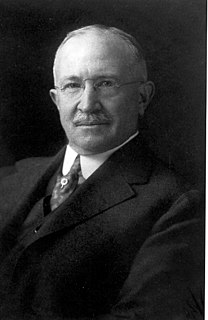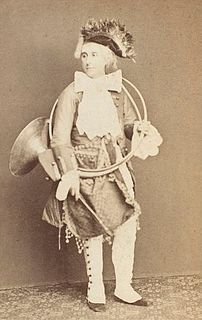See also
| This disambiguation page lists articles about people with the same name. If an internal link led you here, you may wish to change the link to point directly to the intended article. |
Henry Gilbert may refer to:
| This disambiguation page lists articles about people with the same name. If an internal link led you here, you may wish to change the link to point directly to the intended article. |
William Gilbert may refer to:

Henry James Byron was a prolific English dramatist, as well as an editor, journalist, director, theatre manager, novelist and actor.

Charles Henry Bell was an American lawyer and Republican politician from Exeter, New Hampshire. Bell served New Hampshire in both the New Hampshire House of Representatives and the New Hampshire Senate, as a U.S. Senator, and as governor.

The German Reed Entertainments were founded in 1855 and operated by Thomas German Reed (1817–1888) together with his wife, Priscilla German Reed (1818–1895). At a time when the theatre in London was seen as a disreputable place, the German Reed family provided family-friendly entertainments for forty years, showing that respectable theatre could be popular.

Marie Effie Wilton, Lady Bancroft (1839–1921) was an English actress and theatre manager. She appeared onstage as Marie Wilton until after her marriage in December 1867 to Squire Bancroft, when she adopted his last name. Bancroft and her husband were important in the development of Victorian era theatre through their presentation of innovative plays at the London theatres that they managed, first the Prince of Wales's Theatre and later the Haymarket Theatre.

Julia Emilie Neilson was an English actress best known for her numerous performances as Lady Blakeney in The Scarlet Pimpernel, for her roles in many tragedies and historical romances, and for her portrayal of Rosalind in a long-running production of As You Like It.

Charles Henry Collette was an English stage actor, composer and writer noted for his work in comedy in a long career onstage. He appeared, beginning in the late 1860s, in many Bancroft productions and was engaged by other managers, including J. L. Toole, John Hollingshead, Mary Anderson, Lydia Thompson and Herbert Beerbohm Tree, as well as performing in his own companies. He toured for some years as the title character in F. C. Burnand's The Colonel and played many military men.

Victorian burlesque, sometimes known as travesty or extravaganza, is a genre of theatrical entertainment that was popular in Victorian England and in the New York theatre of the mid-19th century. It is a form of parody in which a well-known opera or piece of classical theatre or ballet is adapted into a broad comic play, usually a musical play, usually risqué in style, mocking the theatrical and musical conventions and styles of the original work, and often quoting or pastiching text or music from the original work. Victorian burlesque is one of several forms of burlesque.
Events from the year 1797 in Ireland.

Charles Henry Gilbert was a pioneer ichthyologist and fishery biologist of particular significance to natural history of the western United States. He collected and studied fishes from Central America north to Alaska and described many new species. Later he became an expert on Pacific salmon and was a noted conservationist of the Pacific Northwest. He is considered by many as the intellectual founder of American fisheries biology. He was one of the 22 "pioneer professors" of Stanford University.

Ellen "Nellie" Farren was an English actress and singer best known for her roles as the "principal boy" in musical burlesques at the Gaiety Theatre.
Gilbert is a surname of Germanic origin. The English-language surname is derived from Giselbert, a mediaeval personal name composed of the following Germanic elements: gisil and berht. This personal name was very popular in England during the Middle Ages. The surname is sometimes an Americanized form of numerous like-sounding Jewish surnames. It may also occur in Southern Indian states which it was bestowed by Christian English Missionaries to Adivasi families.

St John-at-Hampstead is a Church of England parish church dedicated to St John the Evangelist in Church Row, Hampstead, London.
Henry Gilbert (1868–1936) was a popular children's author, and the paternal grandfather of Molly Holden. His books continue to be reprinted. His books are noted for both their historical accuracy and their style.

Alfred Sydney Wigan was an English actor-manager who took part in the first Royal Command Performance before Queen Victoria on 28 December 1848.

Robert Soutar was an English actor, comedian, stage manager, writer and director for the theatre. He began his career as a journalist but soon moved into acting. In 1867, he married actress Nellie Farren, and the next year, the two joined the company at the Gaiety Theatre in London. There, he stage managed and wrote for the theatre in addition to acting. His wife became well known for her roles as the "principal boy" in musical burlesques at the theatre. Soutar also directed plays and wrote pantomimes and other pieces. His son was the actor and singer Joseph Farren Soutar.

Marie Litton was the stage name of Mary Jessie Lowe, an English actress and theatre manager. After beginning a stage career in 1868, Litton became an actor-manager in 1871, producing plays for four years at the Court Theatre, including several by W. S. Gilbert. She also appeared in, and sometimes managed, other West End theatres. In the late 1870s, Litton managed the theatre at the Royal Aquarium, where she had some of her biggest acting successes, including as Lady Teazle in The School for Scandal (1877), Lydia Languish in The Rivals (1878), Miss Hardcastle in She Stoops to Conquer and Rosalind in As You Like It.
George James Peirce was an American botanist known for his work on plant physiology. Peirce was born in Manila, Philippines, to American parents George Henry and Lydia Ellen Peirce, and after attending Harvard University earned a PhD at Leipzig University. He served as assistant professor of botany at Indiana University from 1895 to 1897, then joined the faculty of Stanford University, where he spent the remainder of his career in teaching and administrative roles, retiring in 1933. He published three textbooks on plant physiology, was a fellow the American Academy of Arts and Sciences, and served as president of the Botanical Society of America in 1932.